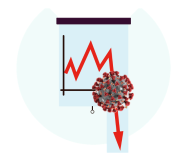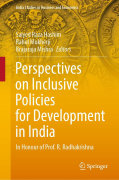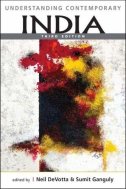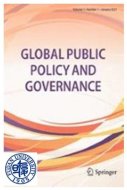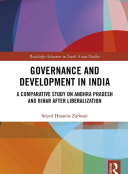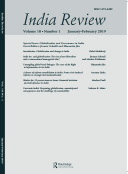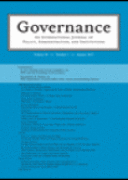Political Economy of Globalisation and Reforms
2022
Rahul Mukherji "Governing India: What Do We Know and Need to Know" in: Saiyed Raza Hashim, Rahul Mukherji and Brajaraja Mishra (Eds.) "Perspectives on Inclusive Policies for Development in India," (Springer, 2022). |
||
|
Prof. Dr. Rahul Mukherji has published a chapter titled "Governing India: What Do We Know and Need to Know" in his book “Perspectives on Inclusive Policies for Development in India”.
|
||
Saiyed Raza Hashim, Rahul Mukherji and Brajaraja Mishra (Eds.) "Perspectives on Inclusive Policies for Development in India," (Springer, 2022). |
||
|
Prof. Dr. Rahul Mukherji has published a book titled “Perspectives on Inclusive Policies for Development in India”. The book was published by Springer and presents perspectives of eminent economists, social scientists and policy makers, exploring the post-reform developments in India, including issues pertaining growth and equity.
|
||
2021
Rahul Mukherji and Seyed Hossein Zarhani “Economies and Development", in Sumit Ganguly and Neil DeVotta, Understanding Contemporary India, (Boulder, Colo: Lynne Rienner Publishers, 2021). |
||
|
Prof Dr. Rahul Mukherji and Dr. Seyed Hossein Zarhani have published a chapter titled “Economies and Development”, in a recently published edited book by Sumit Ganguly and Neil DeVotta on Understanding contemporary India published by Lynne Rienner Publishers, Boulder, Colorado. Access the chapter here.
|
||
Rahul Mukherji and Seyed Hossein Zarhani “Policy paradigms and path dependence: the endogenous roots of institutional displacement and drift in India,” Global Public Policy and Governance - GPPG, vol. 1, No. 1,(2021), pp. 78-97. |
||
|
Professor Rahul Mukherji and Dr. Seyed Hossein Zarhani have published an article on “Policy paradigms and path dependence: the endogenous roots of institutional displacement and drift in India” in the first issue of the Springer Nature journal, Global Public Policy and Governance – GPPG (2021). Read this article here.
|
||
2020
Seyed Hossein Zarhani, Governance and Development in India - A Comparative Study on Andhra Pradesh and Bihar after Liberalization, (Routledge: London, 2020). |
||
|
|
The paperback edition of this book-Governance and Development in India - A Comparative Study on Andhra Pradesh and Bihar after Liberalization. The first edition of this book was published in 2018 . This significant work compares two Indian sub-national states, Andhra Pradesh and Bihar.The book explores the black box of the multi-layered state of India and interactions among the Central Government, the states, regional leaders and other stakeholders. Further information is available here. |
|
2019
Jivanta Schöttli and Himanshu Jha, eds., "Globalization and Governance in India", India Review, Vol.18, No.1(2019). |
||
|
|
Prof. Rahul Mukherji provides the introduction to the latest journal issue which has insightful articles authored by Dr.Jivanta Schottli and Prof. Markus Pohlmann, Dr.Himanshu Jha, Dr.Aseema Sinha and Dr. Markus Pauli. The special issue ends with an epilogue by Prof. Subrata K Mitra. This special issue can be accessed here. |
|
2018
Seyed Hossein Zarhani, Governance and Development in India - A Comparative Study on Andhra Pradesh and Bihar after Liberalization, (Routledge Kindle Edition, 2018). |
||
|
|
"Governance and Development in India - A Comparative Study on Andhra Pradesh and Bihar after Liberalization“ by Dr. Seyed Hossein Zarhani (Department of Political Science, SAI) compares two Indian subnational states, Andhra Pradesh and Bihar. The study of the political economy of development in India is significant as India has emerged as one of the fastest-growing countries during the last three decades and the rate of economic growth and poverty reduction have not been matched in India’s subnational states. The book was released as part of the series „Routledge Advances in South Asian Studies“. Further information is available here. |
|
2017
Rahul Mukherji, “Governance Reform in a Weak State: Thirty Years of Indian Experience”, Governance, Vol. 30 (2017): 53–58. |
|
|
|
The last three decades have witnessed governance transformations in India and China. China gave up autarkic communism and engaged the world. India gradually gave up its somewhat more liberal import substitution-based closed economy model and engaged the world by giving greater primacy to private companies. India began to open up the economy to private investment from the mid-1970s but trade and international orientation arrived only after 1991. By this time, the Chinese economy had become a powerhouse. India's rates of economic growth surpassed China's only in recent years, when the Chinese economy had become much larger than India's. India is the most rapidly growing economy among the Group of 20 countries that discuss the globe's financial architecture. India is home to a weak state in an eco-system powerfully shaped by social forces. The state can neither make a Dengist nor a Lee Kuan Yew type move to swiftly turn the page toward a new policy paradigm. Comprehending India's path requires reconciliation of two apparently contradictory views of the state. The first is the view that India is a weak state. Second, despite being a soft state, policy ideas and changes in worldviews within the state, matter. Third, and consistent with the second point, the Indian model is neither a coerced version of the Washington consensus nor is it a veneration of the Beijing consensus. Policy makers are acutely aware of global developmental paths. What paths they choose, and how gradually such paths get entrenched, despite social forces, lies at the heart of India's developmental journey. This article discusses the nature of India's gradual model governing growth and welfare. |




